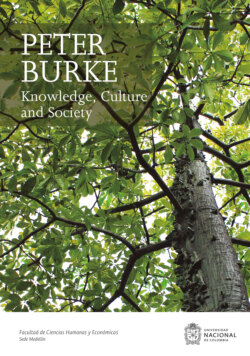Knowledge, Culture and Society

Реклама. ООО «ЛитРес», ИНН: 7719571260.
Оглавление
Peter Burke. Knowledge, Culture and Society
PREFACE
SYMBOLISM AND KNOWLEDGE: THE CULTURE CIRCUIT1. Diana L. Ceballos Gómez2. 1
2
3
1: INTRODUCTION: BEYOND CULTURAL HISTORY?
The rise of cultural history
NCH and the New Historicism
Parallels and Connections: France and the USA
An international movement
A Movement Across Disciplines
Explaining the Cultural Turn
Cultural history and its problems
Extending cultural history
Beyond the concept of ‘culture’
Environmental versus cultural history
The neuroscientific turn
History, hard or soft?
2. THE HISTORY OF THE HISTORY OF KNOWLEDGE
Science or Knowledge? Knowledge or Knowledges?
What is knowledge?
Idealists versus cynics
3. THE SOCIOLOGY AND ANTHROPOLOGY OF KNOWLEDGE
Origins of the sociology of knowledge
The Second Wave
Female scholars
Postcolonial Studies
Ignorance, Secrecy and Leaks
Lost Knowledges
The History of Disciplines
4. THE GEOPOLITICS OF KNOWLEDGE
Problems of Conquest
The Spanish Empire
Centres and peripheries
Early Modern Spain, Centre or Periphery?
Exiles and Expatriates
German Scholars in Eighteenth-Century Russia
French Scholars in Twentieth-Century Brazil
Problems and Achievements
Three Forms of Contribution to Knowledge
5. SPECIALIZATION AND ITS ANTIDOTES
The Rise of Specialization
The History of Interdisciplinarity
Organizing Interdisciplinarity
6. FROM THE DISPUTATION TO POWER POINT: STAGING ACADEMIC KNOWLEDGE IN EUROPE, 1100-2000213
7. THE REPUBLIC OF LETTERS AS A COMMUNICATION SYSTEM; AN ESSAY IN PERIODIZATION252
I
II
III
IV
VI
Notes
BIBLIOGRAPHY
Отрывок из книги
During the Warring States period in China, Chuang Tzu was summoned by a king to paint a crab. In order to accomplish such an enterprise, he requested from the monarch time, housing, food and servants for five years. However, as time passed, there wasn’t even a sketch of the drawing, and Chuang Tzu still required five more years of royal subsidies to complete his project. Finally, the king questioned the painter, who, consumed by time and approaching his death, gave him the most perfect and beautiful drawing ever seen on earth.
Even if the fable alludes to a critical reflection about highly complex art, it turns out to be perfect for the work of human, social and economic sciences in general. How is knowledge measured? How long does it take us to reflect on something and how long to express our thoughts? Perhaps it takes some longer than others, but the difference doesn’t allow us to qualify anyone as better or worse, nor to catalogue those for whom reading takes longer, or whose process takes more time as less intelligent.
.....
In short, we can say: knowledge, different ways of thinking and rationalising, and the subsequent knowledge that derives from such a symbolic stream and from learning abilities (Sperber), available in each culture (Geertz), vary from one society, community, or even sociocultural group to another, and respond to a general symbolic dispositive typical of the human species (Sperber, Cassirer, Durkheim, Boas, Turner, Lévi-Strauss, Durand…). As Giovanni Levi showed, in the great book guided and compiled by Professor Burke, Formas de hacer historia, even within the same culture or community, symbolic structures in different social contexts produce a “multiplicity of representations that is fragmented and differentiated”,50 which materializes in different practices and knowledge (magical, discursive, political, medical, economical practices….).
Magical thinking, against what has been and, surprisingly, continues to be held by some people today, is neither part of a pre-logical nor of a primitive mentality (Lucien Lévy-Bruhl), nor of inferior culture’s superstitions. It is also not a first step, prior to scientific knowledge, as the fathers of anthropology –Tylor and Frazer– or a historian like Robert Mandrou, among others, claimed. It is a complete and coherent system. In its internal coherence, it postulates determinisms as well, and it demands order, but its causality principle varies, as shown in an exemplary way by Edward E. Evans-Pritchard in Witchcraft, Oracles and Magic among the Azande [1937], where he established, against the ideas of his time, the epistemological relativity of other ways of knowledge, by showing that their causality may answer to rationalities different from ours, and that they can also be logical.51
.....